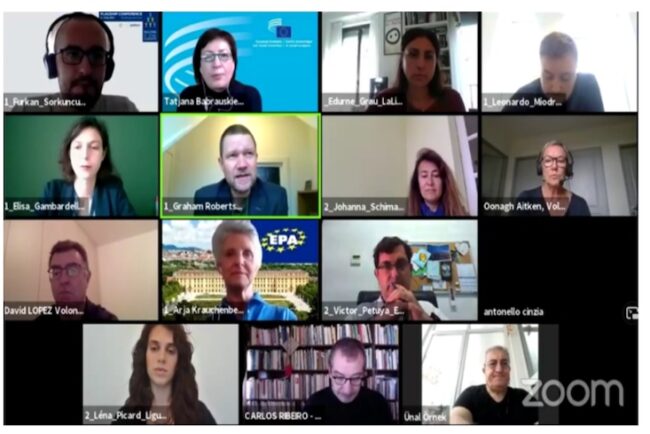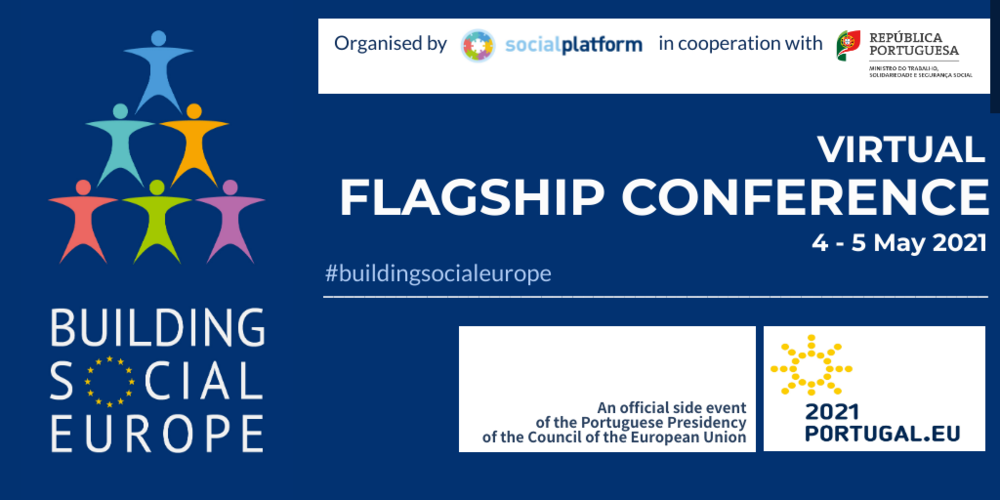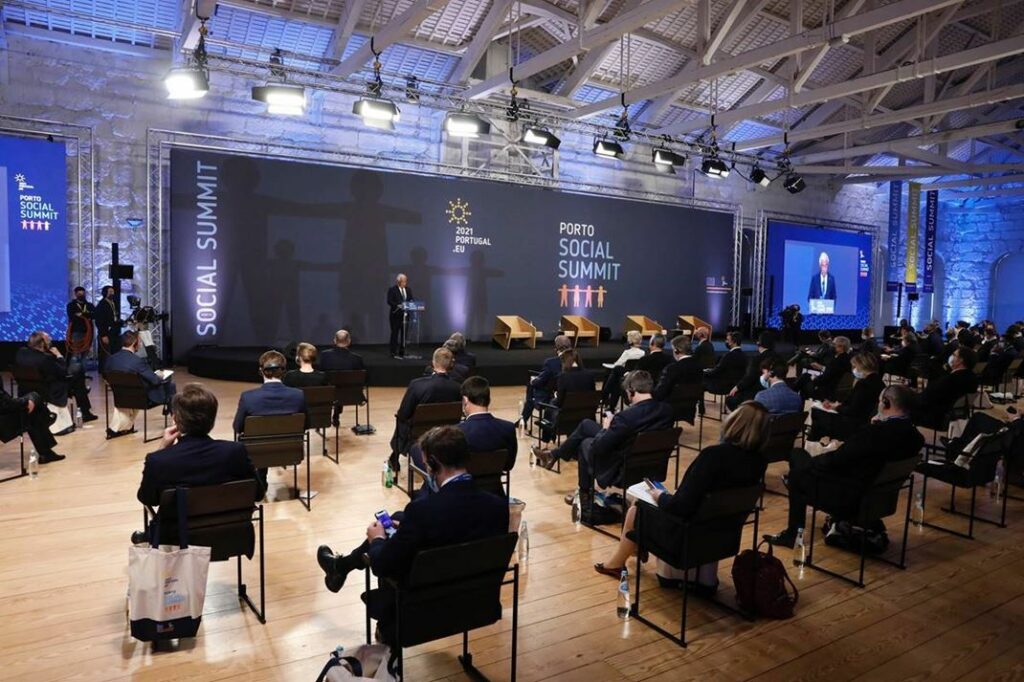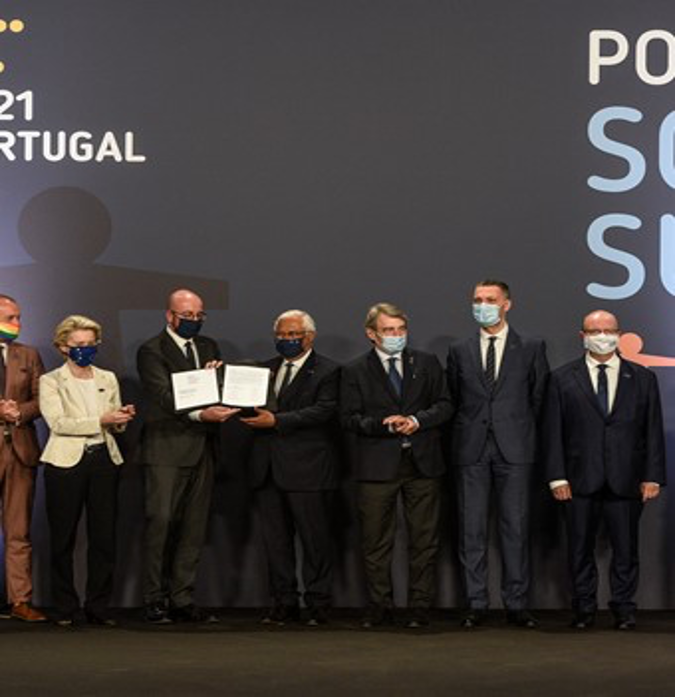Social Platform & EU Social Summit host Flagship Conference
15.07.21
The Social Platform, of which Make Mothers Matter is a member, recently held its annual Flagship Conference "Building Social Europe". This was an official side event of the Portuguese Presidency of the Council of the EU, and brought together at a high-level debate representatives of the European Commission, the Portuguese EU Presidency, the Slovenian EU Presidency, social partners and civil society, ahead of the May 7th EU Social Summit. The discussion addressed the theme "Time to move Social Europe forward: Making the most of the Porto Social Summit to ensure a sustainable and fair recovery and build an Europe that leaves no one behind".

Due to the ongoing pandemic, this year’s conference was held virtually and focused on the Action Plan implementing the European Pillar of Social Rights, launched by the European Commission in March this year, seen as the compass for Europe’s recovery in the European Commission’s work program. The objective of the Flagship Conference was to develop recommendations of civil society organizations to the EU institutions and Member States on the implementation of the Action Plan of the Social Pillar. Aiming at the “identification of the challenges of the EU’s current socio-economic governance models”, the conference also addressed the need for “a better coordination between economic and social policies and the development of alternative models and solutions that are more democratic, people-centred and leave no-one behind. Building synergies and developing strategies between governmental and non-governmental actors to achieve a European Union based on social justice and participatory democracy” was also a key aim1.
 At the Conference, MMM collaborated as a moderator in one of the workshop sessions in preparation for the Porto Social Summit. In particular, MMM participated in the Workshop on skills and life-long learning, entitled Life-long and life-wide learning for a just green transition – organised by Volonteurope, European Parents Association and SOLIDAR Foundation. Building on the actions of the European Union, and more specifically on the European Education Area and the European Skills Agenda, this workshop focused on how to build economic and social policies that ensure a just, inclusive and sustainable European society in which no one is left behind. The workshop speakers and the debate covered a range of relevant issues. Alternating between interactive panel discussions, topics addressed comprised: education policies, lifelong learning and skills for the future, including, for example, the need to improve skills and develop digital competences; lifelong learning for sustainable development and global citizenship, going beyond the immediate needs of the labour market and economic growth; and the validation of skills acquired through social action and volunteering.
At the Conference, MMM collaborated as a moderator in one of the workshop sessions in preparation for the Porto Social Summit. In particular, MMM participated in the Workshop on skills and life-long learning, entitled Life-long and life-wide learning for a just green transition – organised by Volonteurope, European Parents Association and SOLIDAR Foundation. Building on the actions of the European Union, and more specifically on the European Education Area and the European Skills Agenda, this workshop focused on how to build economic and social policies that ensure a just, inclusive and sustainable European society in which no one is left behind. The workshop speakers and the debate covered a range of relevant issues. Alternating between interactive panel discussions, topics addressed comprised: education policies, lifelong learning and skills for the future, including, for example, the need to improve skills and develop digital competences; lifelong learning for sustainable development and global citizenship, going beyond the immediate needs of the labour market and economic growth; and the validation of skills acquired through social action and volunteering.
 At the Porto Social Summit in May and for the first time at these Social Summits of the Council of the EU2, civil society was able to be present at the negotiating table to contribute and officially endorse the Porto Social Commitment, which was signed by the Portuguese Presidency of the Council of the EU, the European Commission, the European Parliament and social partners. This Commitment sets out a shared ambition for a transition to a green, socially just and digital economy that will shape the livelihoods of people in Europe for decades to come.
At the Porto Social Summit in May and for the first time at these Social Summits of the Council of the EU2, civil society was able to be present at the negotiating table to contribute and officially endorse the Porto Social Commitment, which was signed by the Portuguese Presidency of the Council of the EU, the European Commission, the European Parliament and social partners. This Commitment sets out a shared ambition for a transition to a green, socially just and digital economy that will shape the livelihoods of people in Europe for decades to come.
Piotr Sadowski – President of the Social Platform – went as far as to emphasize “The involvement of civil society organizations, which have crucial expertise and knowledge of the realities experienced by people, including those in the most vulnerable situations, as key stakeholders, is essential to ensure the full and ambitious implementation of the social pillar and its action plan3.”
 This Commitment, together with the Porto Declaration, signed by all EU Members States, shows the desire of the EU to put forward a strong European social model. The moment has come to move from declarations to acts and fulfill what one out of ten Europeans have identified as a top priority: a social Europe4.
This Commitment, together with the Porto Declaration, signed by all EU Members States, shows the desire of the EU to put forward a strong European social model. The moment has come to move from declarations to acts and fulfill what one out of ten Europeans have identified as a top priority: a social Europe4.
[1]Social Platform, Flagship Conference https://www.socialplatform.org/what-we-do/flagship-conference/flagship-conference-2021/
[2] Porto Social Summit, https://www.2021portugal.eu/en/porto-social-summit/
[3] https://www.socialplatform.org/news/leading-social-civil-society-organisation-calls-for-member-states-to-be-held-accountable-on-social-rights/
[4] Eurobarometer survey, 2021.03.01
The New EU Gender Equality Roadmap : A Call for Inclusion of Mothers
04.03.25
The European Commission’s initiative on a new Gender Equality Roadmap post-2025, marks a significant step forward in addressing gender disparities across the European Union. Make Mothers Matter (MMM
Breaking the Cycle: Gender Equality as a Path to Better Mental Health
18.03.25
The Council of the European Union has taken a decisive step in recognising the vital connection between gender equality and mental health.
Europe Must Listen to Mothers: Our landmark report heads to the European Parliament
28.08.25
On 22 September 2025, the voices of mothers will take centre stage in Brussels. For the first time, Make Mothers Matter (MMM) will present its State of Motherhood in Europe








